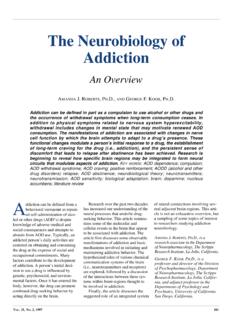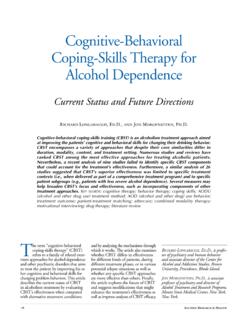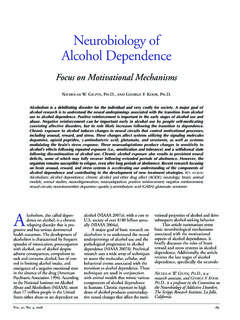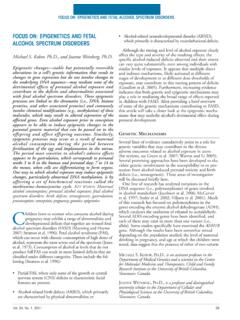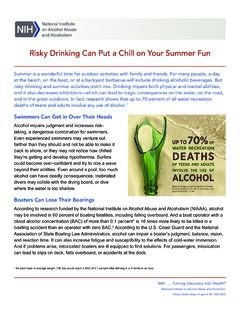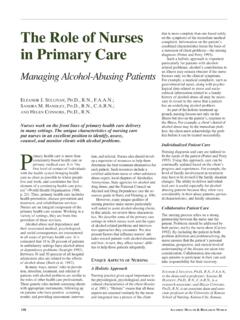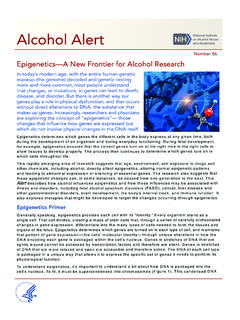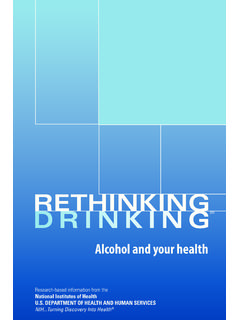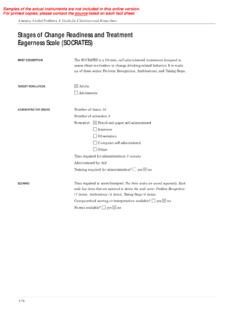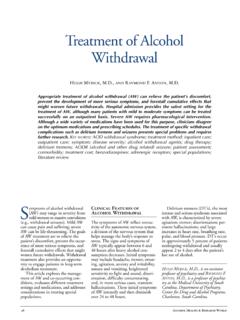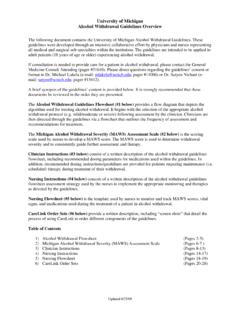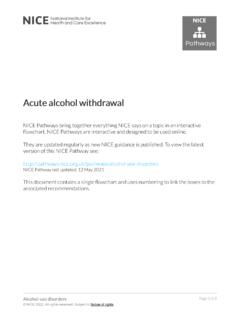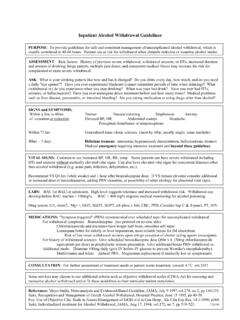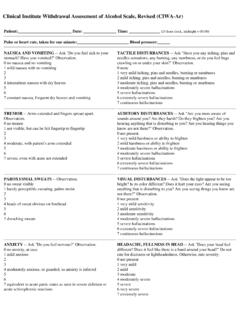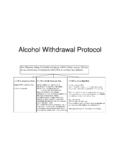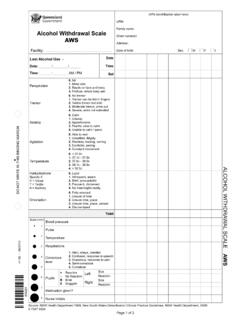Transcription of Kindling in Alcohol Withdrawal - National Institutes of …
1 Vol. 22, No. 1, 199825 Kindling in Alcohol WithdrawalHoward C. Becker, many alcoholics, the severity of Withdrawal symptoms increases after repeated withdrawalepisodes. This exacerbation may be attributable to a Kindling process. Kindling is aphenomenon in which a weak electrical or chemical stimulus, which initially causes no overtbehavioral responses, results in the appearance of behavioral effects, such as seizures, whenit is administered repeatedly. Both clinical and experimental evidence support the existenceof a Kindling mechanism during Alcohol Withdrawal . Withdrawal symptoms, such as seizures,result from neurochemical imbalances in the brain of alcoholics who suddenly reduce orcease Alcohol consumption.
2 These imbalances may be exacerbated after repeated withdrawalexperiences. The existence of Kindling during Withdrawal suggests that even patientsexperiencing mild Withdrawal should be treated aggressively to prevent the increase inseverity of subsequent Withdrawal episodes. Kindling also may contribute to a patient srelapse risk and to Alcohol -related brain damage and cognitive impairment. KEY WORDS: AODwithdrawal syndrome; AODR ( Alcohol and other drug related) seizure; symptom; diseaseseverity; neurotransmission; neurotransmitter receptors; cell electrophysiology; sensory stimuli;biochemical mechanism; AOD abstinence; AODD ( Alcohol and other drug dependence)relapse; brain damage; cognitive process; detoxification; treatment; animal model; clinicalstudy; literature reviewlcohol dependence and alcoholabuse frequently involve drink-ing patterns in which bouts ofheavy drinking ( , binge drinking)are interspersed with periods of absti-nence.
3 During the binge-drinkingepisode, the body, particularly thebrain, adapts to the presence of alco-hol by compensating for Alcohol seffect on the central nervous system(CNS). Alcohol has an overall sup-pressing effect on CNS , the adaptation processinvolves several mechanisms to increasethe excitability of nerve cells ( ,neurons) in the brain that is, theirability to become activated in responseto signals from other neurons. Whenthe Alcohol is eliminated from the bodyduring abstinence, this compensatoryactivation of the CNS remains in effectfor several more days, resulting inexcessive excitability of the CNS ( ,hyperexcitability).
4 This hyperexcitabil-ity manifests itself as Alcohol with-drawal (AW), with symptoms rangingfrom tremors and agitation to seizuresand delirium tremens. As a result of thebingeing-abstaining consumption pat-tern,many alcoholics experience numer-ous Withdrawal episodes during thecourse of their illness (Hillbom 1990).The severity of AW symptoms candiffer widely among alcoholics andeven among different withdrawalepisodes in the same person. Both theamount of Alcohol consumed and theduration of intoxication just beforecessation of drinking are importantdeterminants of the severity of a with-drawal reaction. In addition, a historyof Withdrawal episodes appears to be acritical factor in the intensity of with-drawal symptoms.
5 Accordingly, someresearchers have suggested that repeatedHOWARDC. BECKER, , is anassociate professor in the departments of psychiatry and behavioral sciencesand physiology, Medical University of South Carolina, and an associateresearch career scientist at the VeteransAffairs Medical Center, Charleston,South for this work was provided bythe National institute on Alcohol Abuseand Alcoholism and the Department ofVeterans Affairs Medical may sensitize a person to subsequentwithdrawal episodes. This hypothesisimplies that the severity of Withdrawal -related symptoms may increase in acumulative fashion, with more severesymptoms becoming evident afteryears of Alcohol abuse and numerousperiods of abstinence.
6 The mechanisms underlying theexacerbation of Withdrawal symptomsfollowing repeated Withdrawal episodesare currently unknown. One hypothesisproposes that the phenomenon mayresult from a priming effect, in whicheach consecutive episode of alcoholexposure evokes stronger compen-satory ( , Withdrawal ) responses. Incontrast, Ballenger and Post (1978)have hypothesizedthat the progressiveexacerbation of AW is the manifesta-tion of a Kindling mechanism,which has been observed in otherneurological conditions. According tothis model, it is the repeated experi-ence of AW, rather than repeatedalcohol exposure, that underlies theprogressive intensification of symp-toms.
7 Although more evidencesupports such a Kindling mechanism,a priming effect cannot be ruled fact, the two mechanisms are notmutually exclusive, and both may oper-ate in the final expression of the phe-nomenon (Becker and Littleton 1996).Over the past two decades, numer-ous studies have investigated thephenomenon of Withdrawal sensitiza-tion (Becker and Littleton 1996).This article provides an overview ofclinical and experimental researchfindings supporting the kindlinghypothesis of AW. The article alsoexplores the mechanisms underlyingkindling and addresses implications of Kindling related to AW treatmentstrategies and to long-term conse-quences of alcoholism.
8 Kindling as a Mechanism of Neural SensitizationThe term Kindling was first intro-duced by Goddard and colleagues(1969) to describe a phenomenonobserved after repeated weak electricalstimulation of discrete brain regionsusing electrodes implanted into thebrain. The researchers found that theelectrical stimuli initially produced noovert behavioral effects, such asseizures ( , the stimuli were subcon-vulsive). After repeated periodicapplication, however, the same subcon-vulsive stimuli induced the develop-ment of full motor seizures, suggestingthat the brain had become sensitizedto the stimulation. Additional studiesfound that sensitization could occurregardless of whether the stimulus waselectrical or chemical in nature ( , aconvulsant drug administered directlyinto the brain or into other parts ofthe body) (Gilbert 1992; Post et ).
9 For Kindling to occur, however,it is critical that the subconvulsivestimulus be administered in a repeated,intermittent fashion. This requirementis a unique characteristic of Kindling process is associatedwith increased neuronal excitability,whose time course corresponds to thatof the progressive intensification ofbehavioral and convulsive , once the enhanced brainexcitability and susceptibility to con-vulsions has been established, it canlast for several months. This durabilityof the Kindling phenomenon most likelyreflects long-term changes in neuronalcircuitry and function (McNamaraand Wada 1997). When applying the Kindling hypoth-esis to AW, researchers have postulatedthat each Withdrawal -induced episodeof CNS hyperexcitability may serve as a stimulus that supports a kindlingprocess (Ballenger and Post 1978).
10 Accordingly, although binge drinkingmay not initially result in serious, oreven noticeable, Withdrawal symptoms,repeated episodes of this pattern ofalcohol intoxication followed by absti-nence and Withdrawal may lead to aworsening of future Withdrawal -relatedsymptoms. Thus, a Kindling processmay underlie the commonly observedprogression of Withdrawal symptomsfrom relatively mild responses( ,irritability and tremors) characteristicof initial Withdrawal episodes to moresevere symptoms ( , seizures and delir-ium tremens) associated with subsequentwithdrawal episodes (Ballenger andPost 1978). Kindling in AlcoholWithdrawalClinical EvidenceA growing body of clinical evidencesupports the Kindling hypothesis forAW.
